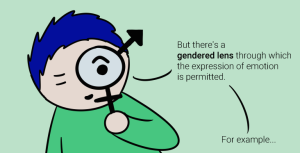Originally published on Adios Barbie and cross-posted here with permission.

Credit: Jeff Rauch
Eating disorder recovery – defined in simplest terms as a remission from disordered eating behavior with the goal of becoming healthy again – can sometimes feel like a delicate balance for those in the process.
Constantly surrounded by the very substance that threatens a relapse into disordered behavior, some people in recovery from an eating disorder (ED) are similar to sober alcoholics: stuck in a world where their hazardous behavior could easily be reestablished in a matter of moments.
The need, then, to keep up constant strength against dangerously negative thoughts and actions can be exhausting, and one lapse in judgment can be disastrous. For this reason, a supportive environment is essential for anyone on the road to recovery.
But where do I start? How do you begin to establish a safe space for your loved one? This guide (which, in its original, longer form can be found here) is meant to be an initial resource.
Although I hope that those of you with eating disorders find comfort in this article (and openly pass it on to your support systems), this is not an article for people in recovery.
Rather, it’s been written specifically for those of you who need a place to start, who are saying, “I know that my friend or family member has a history with an eating disorder. Now what?”
1. Educate Yourself
Before proceeding in supporting a loved one in need, it’s important that you check your biases and misconceptions at the door. Do your research by reading a book, watching a documentary, or looking into the published personal stories of people who have struggled with eating disorders. Brave Girl Eating (2010) by Harriet Brown and Wintergirls (2010) by Laurie Halse Anderson are my personal favorite ED-related books, and the documentary THIN (2006) serves as a fair exploration into residential rehabilitation facilities.
If you want, you can also look into pro-ana and pro-mia websites, but do so with proper intent and at your own discretion. Remember that your loved one does not have to be your first point-of-contact for information on what it’s like to experience an eating disorder or eating disorder recovery; there are thousands of resources available to you that can be found with a quick Google search. A little bit of effort in the way of education can go a long way in preparing you to take the right steps.
2. Be a Good Communicator
Be a presence in your loved one’s life, but not a pressure. Listen if s/he wants to talk, but don’t force it. Try not to be critical or judgmental of what your loved one tells you, even if it’s hard for you to hide your initial reactions. Count to five (or ten – or twenty!) before you say something. Avoid giving advice. Remember that your loved one needs her/his autonomy back.
Instead, validate their feelings and normalize their experiences. Use I-statements, and encourage your loved one to do the same. Offer gentle suggestions if it feels right, but avoid telling your friend what s/he “should” do. If you’re confused about something or want more information, ask questions.
But always be prepared that your loved one might not want to talk about certain subjects.Try to approach questions in a disarming manner: “Is it okay if I ask you some questions? You don’t have to answer them if you don’t want to.” Be compassionate, and stay collected.
3. Avoid Body Talk
Don’t draw attention to her/his body or try to validate her/his experience by talking about your own weight or body image. Body-specific compliments (i.e.: “I wish I had a body like yours,” “I already think you’re beautiful,” etc.) may seem like a viable solution, but they can actually be damaging to a person in recovery.
Well-meaning compliments can be distorted, so it’s best to avoid them. Remember that what might seem like throw-away comments to you about your own body (i.e: “These jeans feel loose,” “I feel so fat today,” etc.) can trigger someone with an eating disorder.
Instead, focus your attention on the person’s non-body-related accomplishments and personality traits. Turn the attention away from the physical. This is difficult to do in a culture where we talk often and openly about our bodies (especially our dissatisfaction with them), so it might take some practice.
4. Be Sensitive Regarding Food and Numbers
Food and numbers are causes of great stress for people with and recovering from eating disorders. Remember this when planning gifts and activities (pro tip: going out to eat or shopping aren’t the best ideas). If you’re eating in the presence of someone with an ED, avoid mentioning food intake (i.e.: “You could afford to eat more,” “You can order more than just a salad,” etc.).
Because numbers often define (and therefore haunt) people with eating disorders, people in recovery need to retrain their minds to stop constantly making calculations. Therefore, avoid any food- or weight-related numbers (i.e.: “I lost five pounds,” “This meal has 600 calories in it,” etc.). Be cognizant of your words.
When in doubt, ask what her/his triggers are.
5. Recognize Accomplishments But Do So Tastefully
When a person is in recovery from an eating disorder, s/he will (hopefully!) start to shed the aversion to food and start to gain weight. When your loved one conquers a fear food or reaches a healthy weight, this is certainly cause for celebration, but be careful how you approach it.
Remember suggestion #3: Avoid body talk. Telling someone in recovery that “you look healthy” can very well translate in her/his mind to “you look fat.” Instead, focus on the accomplishment itself, rather than its physical manifestation. A simple “I’m proud of you” or “keep up the good work” will do.
And a BONUS: Remember Your Own Self-Care
It is not your responsibility to cure someone, nor is it possible. Being there to support someone who is in recovery is a beautiful gesture, and you’re doing something wonderful for that person.
But don’t forget yourself. It’s okay if it becomes overwhelming. It’s okay if you need to step back. It’s okay to be confused, and it’s okay to have questions. Take care of yourself. The important thing is that you’re trying to help.
Eating disorders are difficult – not just for the sufferer, but admittedly for the people who care about that person, too. They’re complicated, and all people are different.
Although this guide is meant to give you some insight into common things that eating disordered individuals want their loved ones to know, the best way to support someone with an eating disorder is to ask what s/he needs – and to be realistic about your reaction, response, and ability.
For more information on eating disorders, visit the National Eating Disorders Association (NEDA) website or call them toll-free at 1.800.931.2237.
[do_widget id=”text-101″]
Melissa A. Fabello is a Contributing Writer for Everyday Feminism, a feminist blogger and vlogger, and online peer sex educator, based out of Philadelphia. She is a second-year graduate student, working on an M.Ed. in Human Sexuality. She can be reached on Twitter @fyeahmfabello.
Search our 3000+ articles!
Read our articles about:
Our online racial justice training
Used by hundreds of universities, non-profits, and businesses.
Click to learn more




















